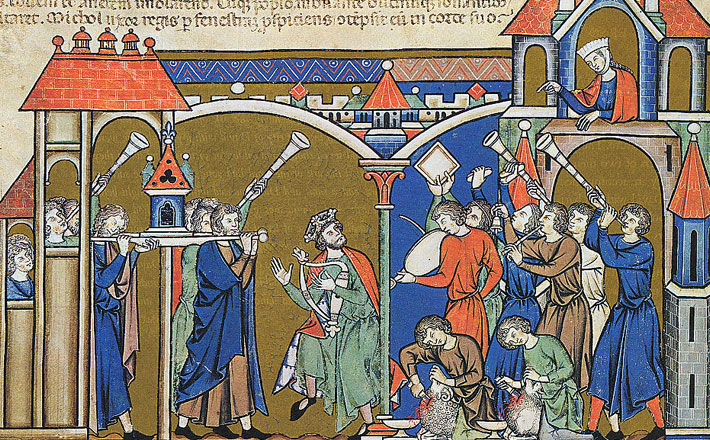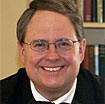Commentary on Mark 6:14-29
The preacher of this text for this Sunday’s sermon receives my congratulations for originality and guts.
Who preaches on the death of John the Baptist? Except for special occasions, who speaks of politics from the pulpit even when the Bible authorizes it?
Years ago, or only yesterday, The Washington Post quoted a lavishly paid lobbyist: “There are only two engines that drive Washington: One is greed, and the other is fear.” That’s a fine description of Herod’s birthday party. You recall Herod Antipas (ca. 21 B.C. — post-A.D. 39): tetrarch of Galilee and Perea, answerable to the Emperor Tiberius. Most historians remember him as maladroit and weak. When it comes to our governors, some things never change.
Mark tells of a three-sided triangle: Herod, his wife Herodias, and John the Baptist, whose arrest was the last we heard of him (Mark 1:14). Defying Torah (Leviticus 18:13-16; 20:21), Herod had married his sister-in-law. John had called them out (Mark 6:18). Believing him righteous and holy, Herod admired his accuser (6:20). Nursing a grudge, Herodias wanted John dead (6:19). Herod compromised: he arrested and jailed under protective custody the threatening preacher to whom he enjoyed listening (6:17, 20). His wife’s opportunity (literally, “a happy day”) came at a state dinner, at which her young daughter “danced and pleased Herod and his guests” (6:21-22). The lecherous fool promised her whatever she asked (6:22-23). After consulting her mother, the girl sprang the trap: “I want John’s head on a salver — right now” (6:24-25). Herod was caught. Saving face was an issue (6:26); worse, defaulting on an oath could be reckoned tantamount to taking God’s name in vain (Philo, On the Special Laws 2.9-10). Birthday morphed into deathday: John’s head was delivered to Mother by a ghoulish bucket brigade (Mark 6:27-28).
Ghastly though it be, this tale is told with masterly understatement. “It is Elijah” (6:15a): another prophet who collided with another weak king manipulated by another murderous wife (1 Kings 18–21). “A righteous and holy man” (Mark 6:20a): just like elderly Eleazar, refusing to compromise Jewish principles to avoid state-sanctioned death (2 Maccabees 6:18-31). “What is your request? It shall be given you, even to the half of my kingdom.” That’s the promise of King Hesperus to Queen Esther (Esther 5:3; 7:27). “John, whom I beheaded, has been raised” (Mark 6:16): the dead has returned with awesome power (6:14), but haunted Herod has misidentified the Risen One (16:6). “The king was deeply grieved” (6:26): a fat lot of good that does John. Herod is so feckless that the executioner delivers the victim’s head, not to the king as ordered (6:27), but to the girl (6:28). What’s on her mind? She’s the one who demands the head “on a platter” (6:25). Without help, most congregations would miss these details. The larger issue, however, is how well Mark teaches us to tell a story. Hook listeners’ imaginations to fill in some blanks, and a sermon can come alive — because they have been invited to help you preach it.
But why does Mark tell this story: the longest of the Gospel’s anecdotes and its only flashback? Aside from the Golgotha plot (Mark 14:1-2 + 10-11) and discovery of the empty tomb (Mark 16:1-8), this is the only tale in which Jesus never appears. Its villains never reappear (cf. Luke 23:6-12). It’s a strange story about John in which the baptizer himself never appears. Even stranger: beneath this story of John is the story of Jesus. The flashback is a flashforward. Mark tips us off in 6:14-16: the confusion over agency for Jesus’ mighty works (cf. the identical refrain in 8:27-29). Herod foreshadows Pilate in the same way that John presages Jesus (1:1-15; 9:9-13; 11:27-33). The two prefects are nominally in charge. Like Antipas, Pilate is amazed (6:20; 15:5) by circumstances surrounding an innocent prisoner (6:17, 20; 15:1, 14a), swept up in events that fast spin out of his control (6:21-25; 15:6-13), and unable to back down after being publicly outmaneuvered (6:26-27; 15:15). Like John, Jesus is passive in his final hours (6:14-19; 15:1-39), faces with integrity his moment of truth (6:21: hemeras eukairou, “an opportunity came”; 12:2: to kairo, “the season came”), and is executed by hideous capital punishment (6:27-28; 15:24-27), dying to placate those he offends (6:19, 25; 15:10-14). John’s disciples give their teacher a proper burial (6:29). What will become of the twelve after Jesus’ death (14:27, 50-52; 15:40-47)? That’s a pertinent question: Mark has embedded 6:14-29 in the middle of their successful mission (6:7-13), about which they will offer Jesus a jolly report “of all they [have] done and taught” (6:30). Fatal intrigue casts a shadow over the routing of demons and healing of the sick (6:13).
Where’s the good news in Mark 6:14-29? There may be none. The drive shafts of corrupted politics torque this birthday party. Everywhere greed and fear whisper: in Herod’s ear, among Galilee’s high and mighty, behind the curtain between mother and daughter, in a dungeon prison. When repentance is preached to this world’s princes, do not expect them to relinquish their power, however conflicted some may be. The righteous die for reasons both valorous and vapid. “[A]s the fishes that are taken in an evil net, and as the birds that are caught in the snare; so are the sons of men snared in an evil time” (Ecclesiastes 9:12 KJV). Mark is no more a fool than Qohelet.
Neither is the Evangelist cynical. Herod’s banquet is only the first of two in Mark 6. Jesus hosts the second, in the middle of nowhere for thousands of nobodies with nothing to offer save five loaves and two fish. At that feast greed and fear have no place. There all are fed to the full, with leftovers beyond comprehension (6:30-44).
In the high heat of summer, Mark 6:14-29 beckons you to preach the mystery of Good Friday before the Easter of 6:30-44 next Sunday. Do you have the guts to try?


July 12, 2015